Springboot国际化信息(i18n)解析
Posted hujunzheng
tags:
篇首语:本文由小常识网(cha138.com)小编为大家整理,主要介绍了Springboot国际化信息(i18n)解析相关的知识,希望对你有一定的参考价值。
国际化信息理解
国际化信息也称为本地化信息 。 Java 通过 java.util.Locale 类来表示本地化对象,它通过 “语言类型” 和 “国家/地区” 来创建一个确定的本地化对象 。举个例子吧,比如在发送一个具体的请求的时候,在header中设置一个键值对:"Accept-Language":"zh",通过Accept-Language对应值,服务器就可以决定使用哪一个区域的语言,找到相应的资源文件,格式化处理,然后返回给客户端。
MessageSource
Spring 定义了 MessageSource 接口,用于访问国际化信息。
- getMessage(String code, Object[] args, String defaultMessage, Locale locale)
- getMessage(String code, Object[] args, Locale locale)
- getMessage(MessageSourceResolvable resolvable, Locale locale)
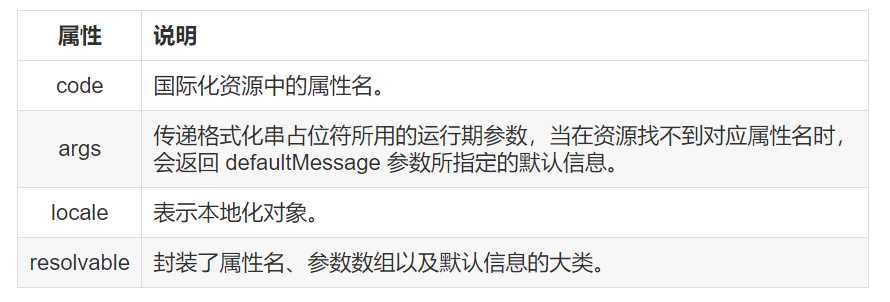
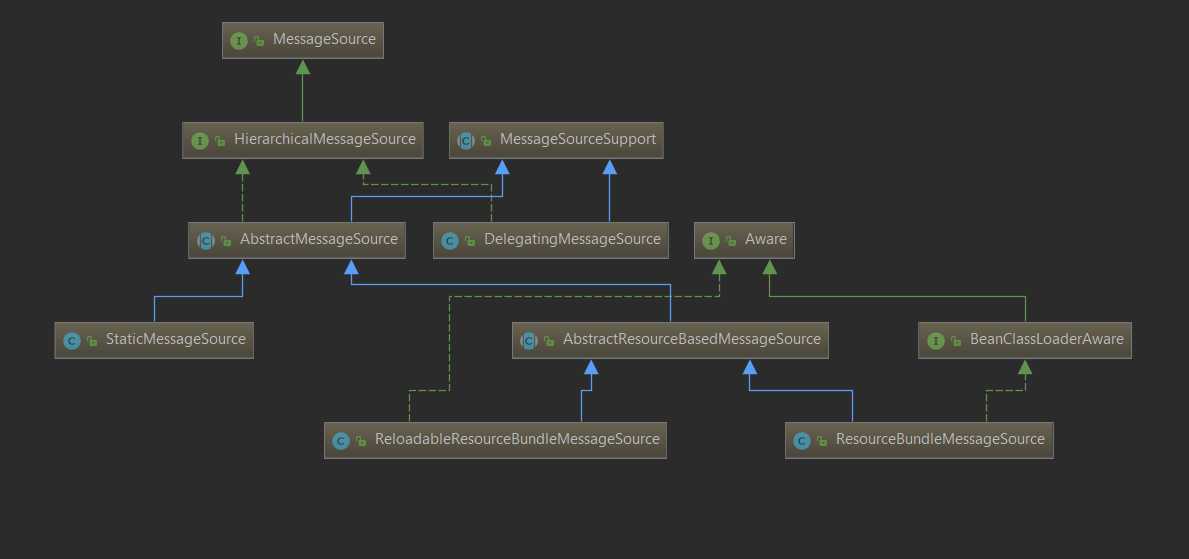
MessageSourceAutoConfiguration
springboot提供了国际化信息自动配置类,配置类中注册了ResourceBundleMessageSource实现类。

1 @Configuration 2 @ConditionalOnMissingBean(value = MessageSource.class, search = SearchStrategy.CURRENT) 3 @AutoConfigureOrder(Ordered.HIGHEST_PRECEDENCE) 4 @Conditional(ResourceBundleCondition.class) 5 @EnableConfigurationProperties 6 public class MessageSourceAutoConfiguration 7 8 private static final Resource[] NO_RESOURCES = ; 9 10 @Bean 11 @ConfigurationProperties(prefix = "spring.messages") 12 public MessageSourceProperties messageSourceProperties() 13 return new MessageSourceProperties(); 14 15 16 @Bean 17 public MessageSource messageSource(MessageSourceProperties properties) 18 ResourceBundleMessageSource messageSource = new ResourceBundleMessageSource(); 19 if (StringUtils.hasText(properties.getBasename())) 20 messageSource.setBasenames(StringUtils.commaDelimitedListToStringArray( 21 StringUtils.trimAllWhitespace(properties.getBasename()))); 22 23 if (properties.getEncoding() != null) 24 messageSource.setDefaultEncoding(properties.getEncoding().name()); 25 26 messageSource.setFallbackToSystemLocale(properties.isFallbackToSystemLocale()); 27 Duration cacheDuration = properties.getCacheDuration(); 28 if (cacheDuration != null) 29 messageSource.setCacheMillis(cacheDuration.toMillis()); 30 31 messageSource.setAlwaysUseMessageFormat(properties.isAlwaysUseMessageFormat()); 32 messageSource.setUseCodeAsDefaultMessage(properties.isUseCodeAsDefaultMessage()); 33 return messageSource; 34 35 36 protected static class ResourceBundleCondition extends SpringBootCondition 37 38 private static ConcurrentReferenceHashMap<String, ConditionOutcome> cache = new ConcurrentReferenceHashMap<>(); 39 40 @Override 41 public ConditionOutcome getMatchOutcome(ConditionContext context, 42 AnnotatedTypeMetadata metadata) 43 String basename = context.getEnvironment() 44 .getProperty("spring.messages.basename", "messages"); 45 ConditionOutcome outcome = cache.get(basename); 46 if (outcome == null) 47 outcome = getMatchOutcomeForBasename(context, basename); 48 cache.put(basename, outcome); 49 50 return outcome; 51 52 53 private ConditionOutcome getMatchOutcomeForBasename(ConditionContext context, 54 String basename) 55 ConditionMessage.Builder message = ConditionMessage 56 .forCondition("ResourceBundle"); 57 for (String name : StringUtils.commaDelimitedListToStringArray( 58 StringUtils.trimAllWhitespace(basename))) 59 for (Resource resource : getResources(context.getClassLoader(), name)) 60 if (resource.exists()) 61 return ConditionOutcome 62 .match(message.found("bundle").items(resource)); 63 64 65 66 return ConditionOutcome.noMatch( 67 message.didNotFind("bundle with basename " + basename).atAll()); 68 69 70 private Resource[] getResources(ClassLoader classLoader, String name) 71 String target = name.replace(‘.‘, ‘/‘); 72 try 73 return new PathMatchingResourcePatternResolver(classLoader) 74 .getResources("classpath*:" + target + ".properties"); 75 76 catch (Exception ex) 77 return NO_RESOURCES; 78 79 80 81 82 83
首先MessageSource配置生效依靠一个ResourceBundleCondition条件,从环境变量中读取spring.messages.basename对应的值,默认值是messages,这个值就是MessageSource对应的资源文件名称,资源文件扩展名是.properties,然后通过PathMatchingResourcePatternResolver从“classpath*:”目录下读取对应的资源文件,如果能正常读取到资源文件,则加载配置类。
springmvc自动装配配置类,注册了一个RequestContextFilter过滤器。

每一次请求,LocaleContextHolder都会保存当前请求的本地化信息。

通过MessageSourceAccessor根据code获取具体信息时,如果默认配置的本地化对象为空,则通过LocaleContextHolder获取。


上图的messageSource是应用程序上下文对象(本文创建的是GenericWebApplicationContext实例),该messageSource对象会调用ResourceBundleMessageSource实例获取具体信息。
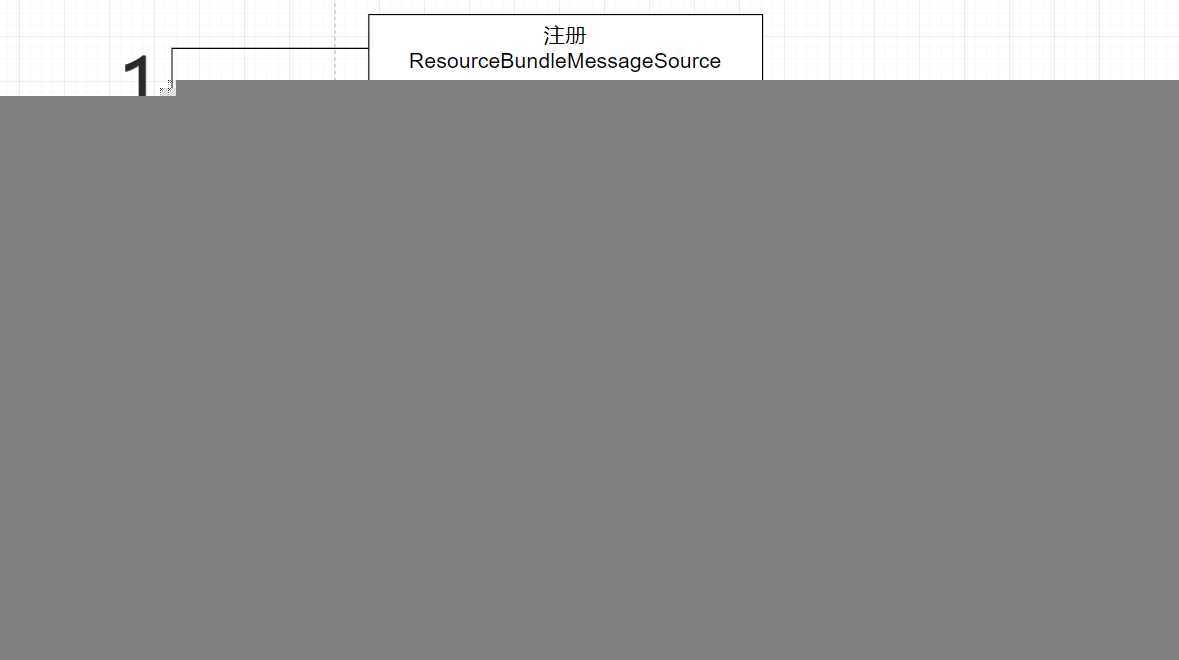
ValidationAutoConfiguration
参数校验hibernate-validator是通过这个自动装配加载进来的。

1 @Configuration 2 @ConditionalOnClass(ExecutableValidator.class) 3 @ConditionalOnResource(resources = "classpath:META-INF/services/javax.validation.spi.ValidationProvider") 4 @Import(PrimaryDefaultValidatorPostProcessor.class) 5 public class ValidationAutoConfiguration 6 7 @Bean 8 @Role(BeanDefinition.ROLE_INFRASTRUCTURE) 9 @ConditionalOnMissingBean(Validator.class) 10 public static LocalValidatorFactoryBean defaultValidator() 11 LocalValidatorFactoryBean factoryBean = new LocalValidatorFactoryBean(); 12 MessageInterpolatorFactory interpolatorFactory = new MessageInterpolatorFactory(); 13 factoryBean.setMessageInterpolator(interpolatorFactory.getObject()); 14 return factoryBean; 15 16 17 @Bean 18 @ConditionalOnMissingBean 19 public static MethodValidationPostProcessor methodValidationPostProcessor( 20 Environment environment, @Lazy Validator validator) 21 MethodValidationPostProcessor processor = new MethodValidationPostProcessor(); 22 boolean proxyTargetClass = environment 23 .getProperty("spring.aop.proxy-target-class", Boolean.class, true); 24 processor.setProxyTargetClass(proxyTargetClass); 25 processor.setValidator(validator); 26 return processor; 27 28 29
MethodValidationPostProcessor这个后置处理处理方法里单个参数校验的注解(JSR和Hibernate validator的校验只能对Object的属性(也就是Bean的域)进行校验,不能对单个的参数进行校验。)。
LocalValidatorFactoryBean实现了javax.validation.ValidatorFactory和javax.validation.Validator这两个接口,以及Spring的org.springframework.validation.Validator接口,你可以将这些接口当中的任意一个注入到需要调用验证逻辑的Bean里。
默认情况下,LocalValidatorFactoryBean创建的validator使用PlatformResourceBundleLocator获取资源的绑定关系,获取的资源名称是:ValidationMessages
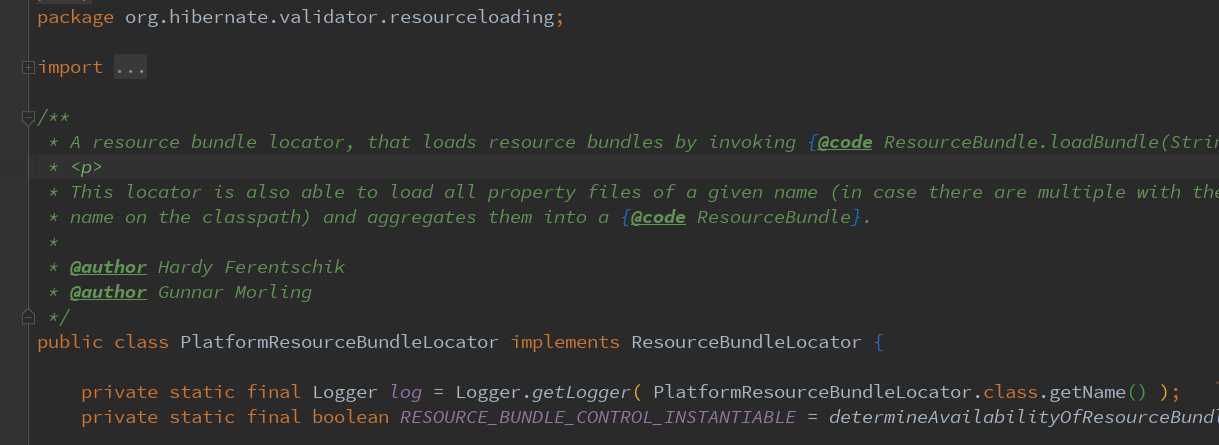
用户自定义的校验信息放在项目classpath目录下。

另外hibernate-validator还会加载默认的校验资源文件,名称是:org.hibernate.validator.ValidationMessages。可以看到,默认的校验资源捆绑文件包含了不同区域的信息的配置。
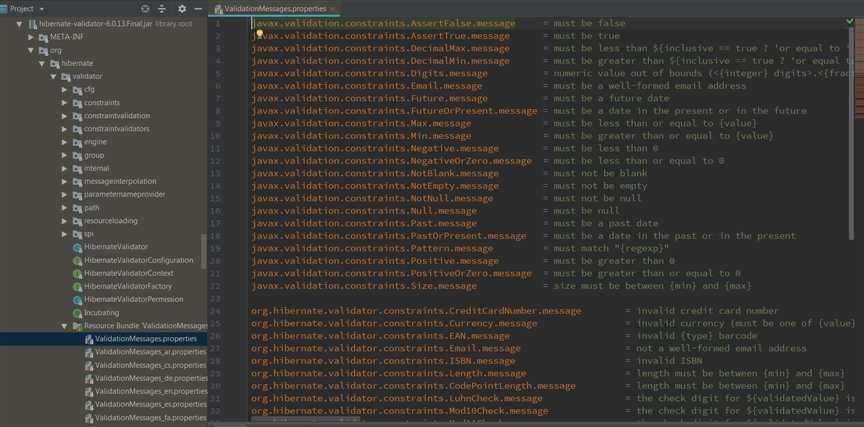
通过LocalValidatorFactoryBean获取的validator是如何根据不同的地区加载不同校验资源文件呢?hibernate-validator暴露了一个消息插补器(MessageInterpolator),spring正是重新代理这个消息插补器。

通过LocaleContextMessageInterpolator源码,可以看到最终还是通过LocaleContextHolder获取当前时区信息。
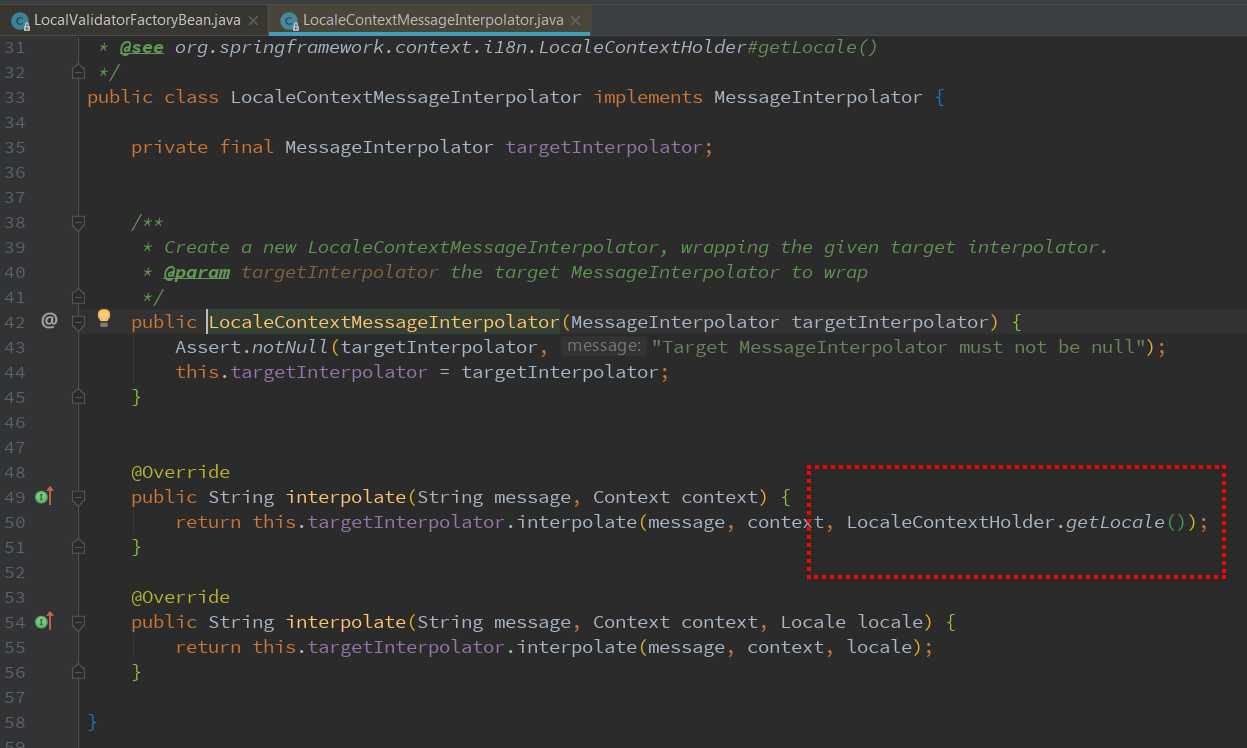
是否可以自定义国际化校验的资源信息呢?当然是肯定的,我们只需要重写LocalValidatorFactoryBean类型bean的创建过程,通过setValidationMessageSource方法指定自定义的资源信息。
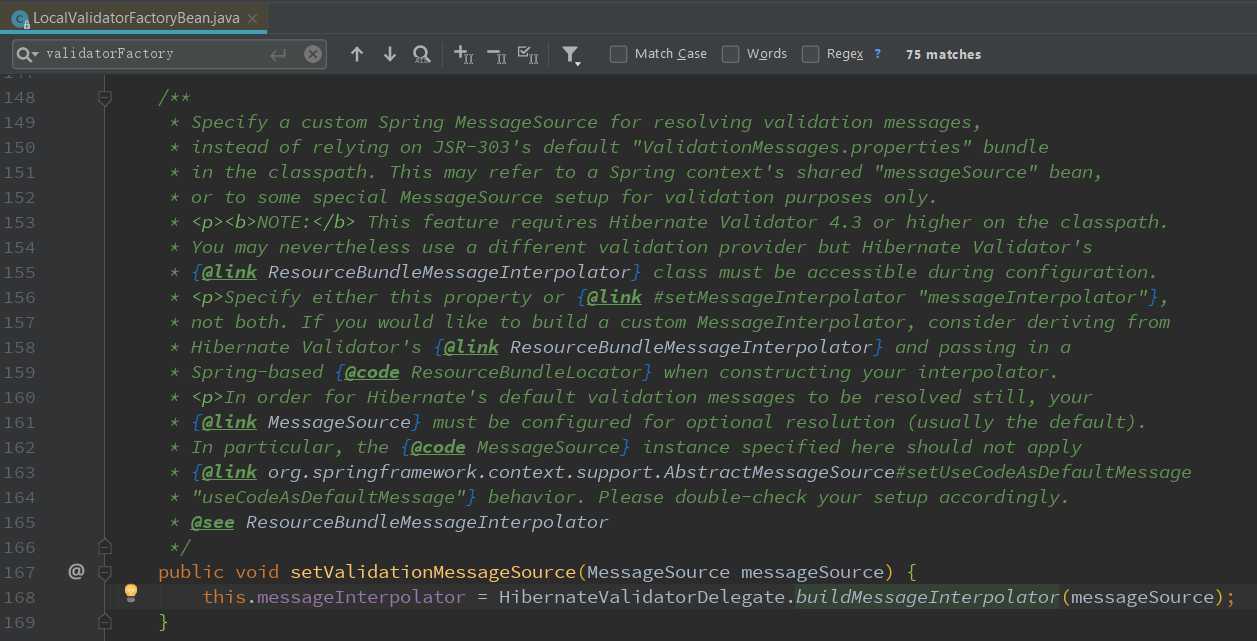
MessageSource测试
基础测试
建立Resouce bundle messages

编写message source测试方法,从request中获取当前Locale值

编写测试类,指定当前请求的Locale值或者设置请求头的header值:Accept-Language:zh
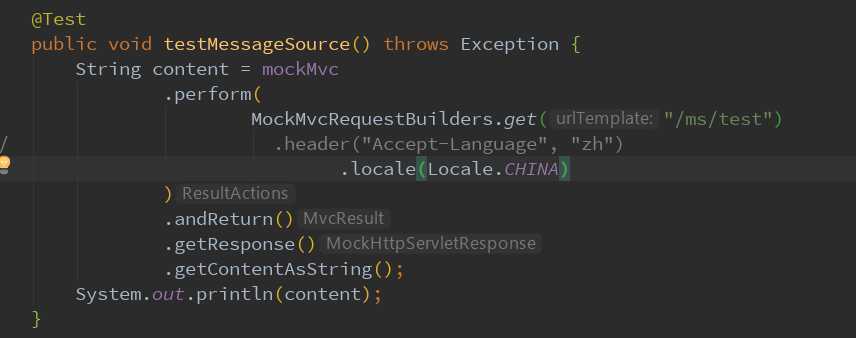
根据测试类中请求的Locale值不同,获取到的文本也不同。
格式化测试
建立Resouce bundle messages

编写message source测试方法,从request中获取当前Locale值

编写测试类,指定当前请求的Locale值或者设置请求头的header值:Accept-Language:zh
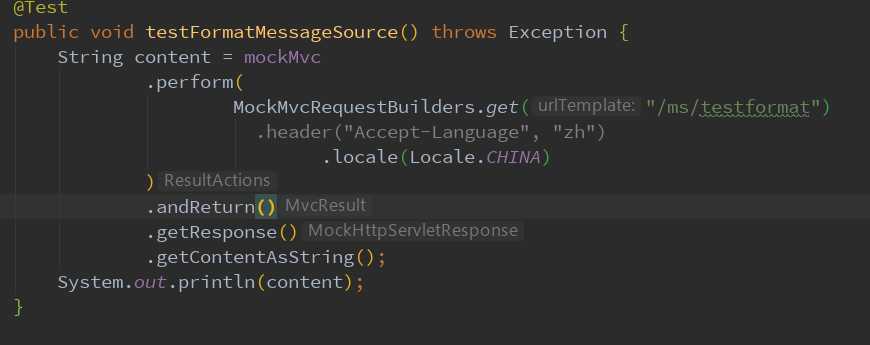
根据测试类中请求的Locale值不同,获取到的格式化的文本也不同。
静态message source测试
动态注册message(可区分Locale),可用于自定义message source。

编写测试的方法,通过MessageSourceAccessor访问。

编写测试类,获取自定义message source中的信息。
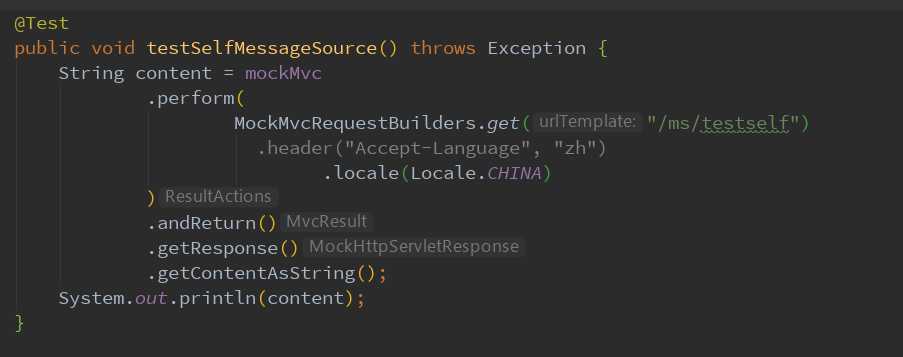
根据测试类中请求的Locale值不同,获取到的文本也不同。
以上是关于Springboot国际化信息(i18n)解析的主要内容,如果未能解决你的问题,请参考以下文章
